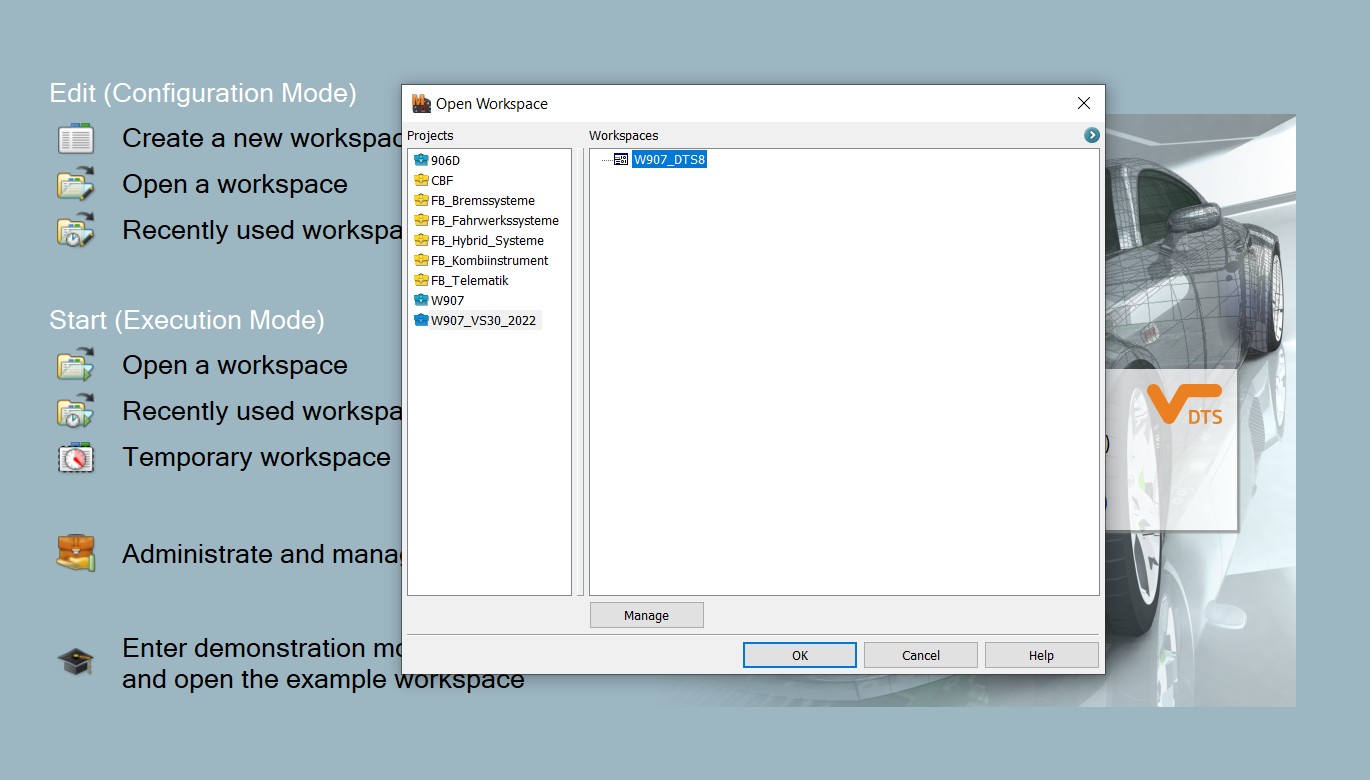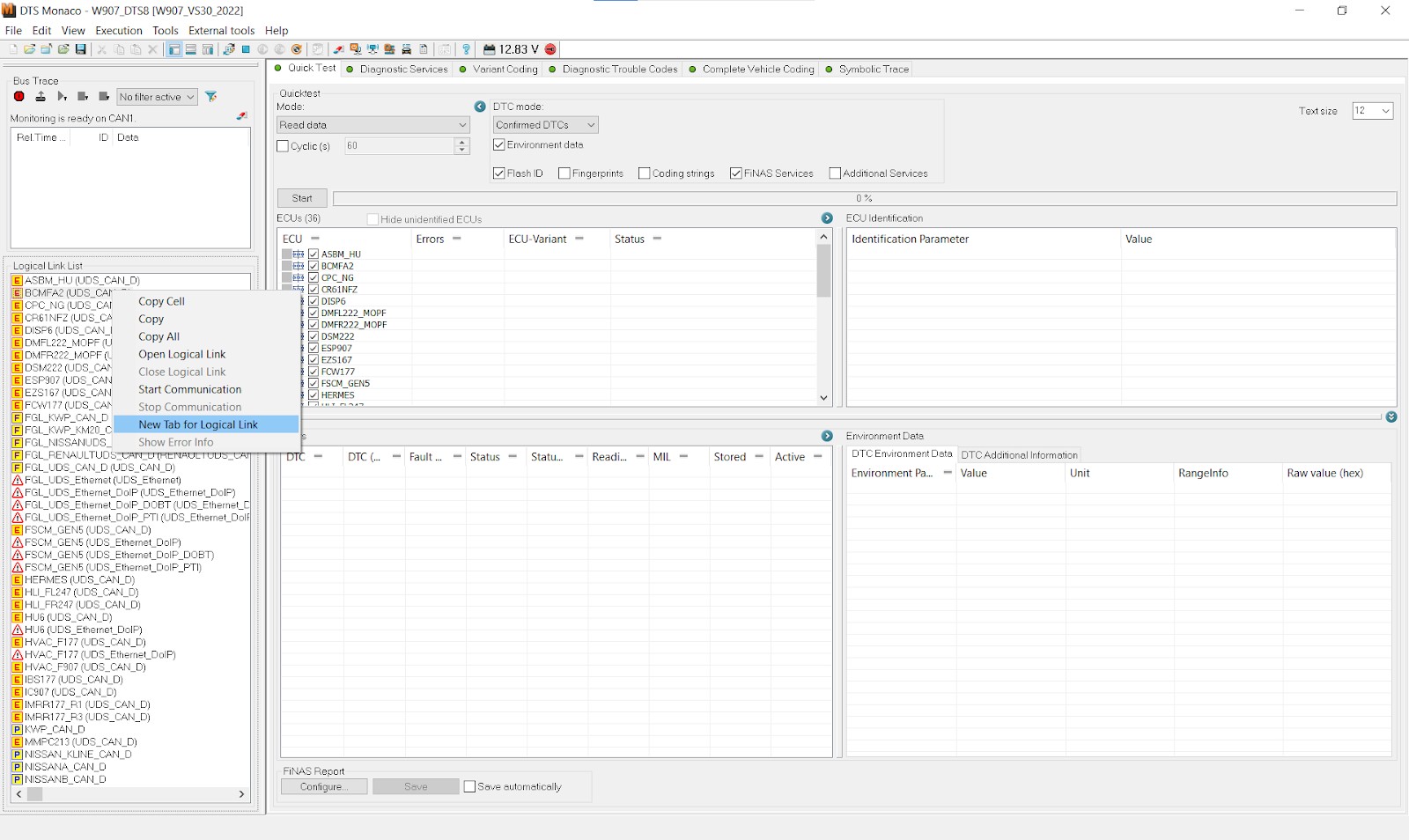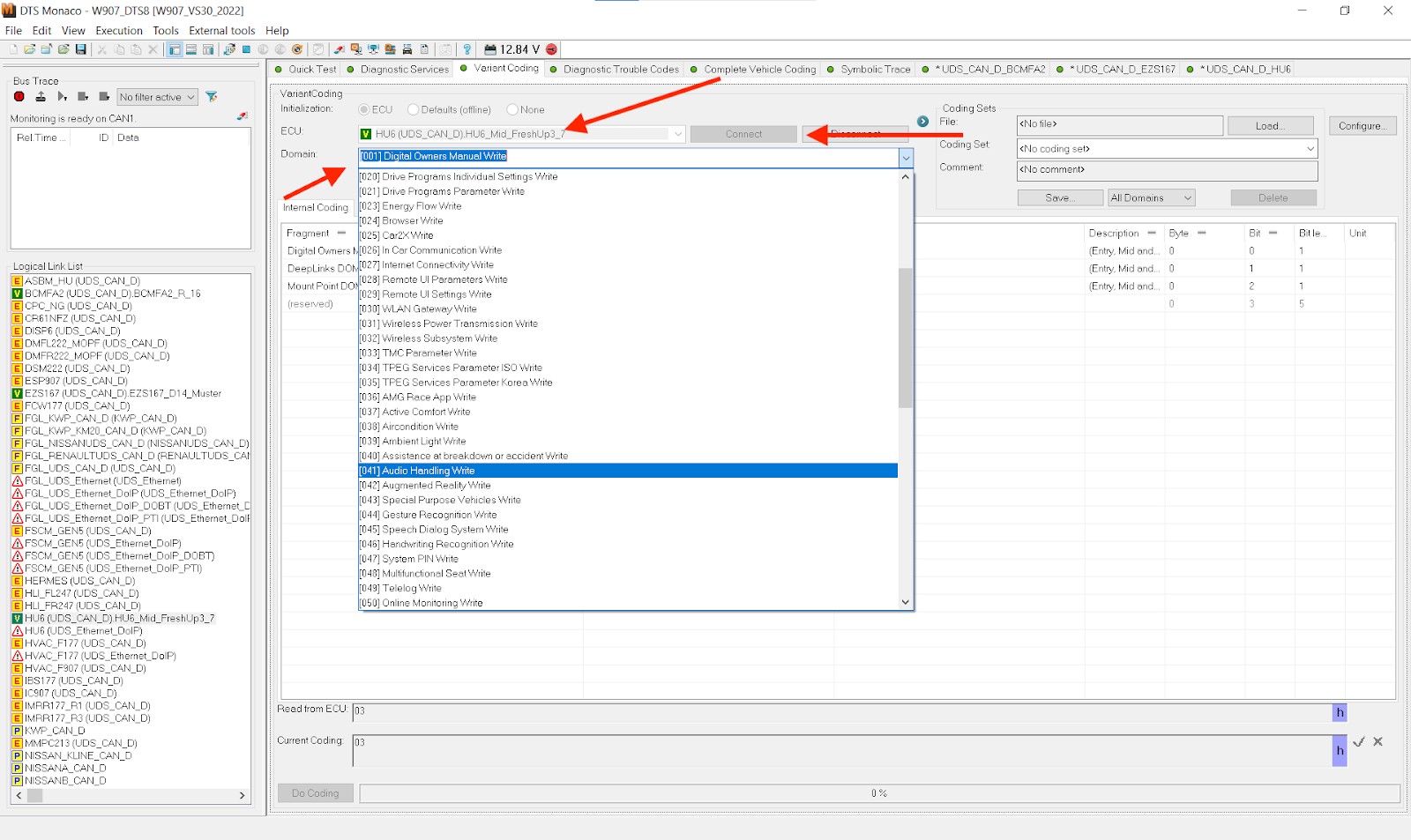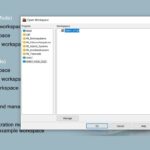Can DTS Monaco save and load ECU coding backups? Yes, DTS Monaco often integrates the ability to save and load ECU coding backups directly into its projects, offering a robust safeguard against data loss and coding errors. At DTS-MONACO.EDU.VN, we empower automotive technicians and enthusiasts with the knowledge and tools to confidently navigate ECU coding, ensuring seamless restoration and modification processes. Explore our comprehensive resources for ECU reflashing, car programming, and module programming to unlock the full potential of your vehicle’s electronic systems.
Contents
- 1. What is DTS Monaco and Why is ECU Coding Backup Important?
- 1.1 What is DTS Monaco?
- 1.2 Why Back Up ECU Coding?
- 1.3 Who Benefits from ECU Coding Backups?
- 2. Saving ECU Coding with DTS Monaco
- 2.1 Project Backups
- 2.2 Saving Individual ECU Configurations
- 2.3 Integrated Backup Features
- 3. Loading ECU Coding with DTS Monaco
- 3.1 Loading Project Backups
- 3.2 Loading Individual ECU Configurations
- 3.3 Verifying the Loaded Coding
- 4. Integrating Backups into DTS Monaco Projects
- 4.1 Creating a Backup Schedule
- 4.2 Using Version Control
- 4.3 Storing Backups Securely
- 4.4 Documenting Backup Procedures
- 5. Common Issues and Troubleshooting
- 5.1 Backup File Corruption
- 5.2 Incompatible Backup Versions
- 5.3 Connection Problems
- 5.4 Software Errors
- 5.5 Insufficient Storage Space
- 6. Best Practices for ECU Coding Backups
- 6.1 Regular Backups
- 6.2 Multiple Backup Locations
- 6.3 Descriptive File Naming
- 6.4 Version Control
- 6.5 Testing Backups
- 6.6 Security Measures
- 7. Advanced Techniques in DTS Monaco
- 7.1 Scripting and Automation
- 7.2 Data Comparison
- 7.3 Diagnostic Logging
- 7.4 Custom Coding Templates
- 7.5 Remote Coding
- 8. Real-World Applications
- 8.1 Retrofitting Features
- 8.2 Performance Tuning
- 8.3 Repairing Damaged ECUs
- 8.4 Customizing Vehicle Settings
- 8.5 Diagnosing Electrical Problems
- 9. Training and Resources at DTS-MONACO.EDU.VN
- 9.1 Comprehensive Training Modules
- 9.2 Hands-On Exercises
- 9.3 Expert Support
- 10. Future Trends in ECU Coding
- 10.1 Over-the-Air (OTA) Updates
- 10.2 Artificial Intelligence (AI)
- 10.3 Cybersecurity
- 10.4 Cloud-Based Coding
- 10.5 Standardized Coding Protocols
- FAQ: DTS Monaco and ECU Coding Backups
1. What is DTS Monaco and Why is ECU Coding Backup Important?
DTS Monaco is a powerful diagnostic and programming tool widely used in the automotive industry for Electronic Control Unit (ECU) coding, diagnostics, and reflashing. Its capabilities extend to advanced functions like variant coding, allowing technicians to customize vehicle features. ECU coding backup is a critical process that involves saving the original configuration of an ECU before making any changes. This ensures that if something goes wrong during the coding process, the original settings can be restored, preventing potential damage to the vehicle’s electronic systems. Understanding its importance helps to mitigate risks associated with ECU modifications.
1.1 What is DTS Monaco?
DTS Monaco, short for Daimler Test System Monaco, is a sophisticated software solution designed for diagnosing, programming, and coding ECUs in modern vehicles, especially those from Mercedes-Benz and other Daimler brands. It offers a comprehensive suite of tools for vehicle diagnostics, ECU flashing, and parameter adjustments. According to a study by the Society of Automotive Engineers (SAE) International in February 2024, DTS Monaco is valued for its direct access to ECU data and its ability to perform complex coding operations.
1.2 Why Back Up ECU Coding?
Backing up ECU coding is paramount for several reasons:
- Preventing Data Loss: During coding, there’s always a risk of data corruption or errors that can render an ECU inoperable. A backup ensures that you can restore the ECU to its original state.
- Reverting Unsuccessful Changes: If a coding modification doesn’t produce the desired result or causes unintended side effects, a backup allows you to revert to the previous configuration.
- Protecting Against System Instability: Incorrect coding can lead to system instability, affecting various vehicle functions. A backup provides a safety net, minimizing downtime and repair costs.
- Facilitating Experimentation: Backups encourage experimentation with coding modifications, knowing that you can always return to a stable, original state.
- Ensuring Documentation: Backups serve as documentation of the ECU’s original settings, which can be valuable for future diagnostics and repairs.
1.3 Who Benefits from ECU Coding Backups?
ECU coding backups benefit a wide range of professionals and enthusiasts:
- Automotive Technicians: Technicians performing ECU coding as part of repairs or upgrades rely on backups to protect against errors and ensure customer satisfaction.
- Car Coders: Professionals specializing in car coding use backups to experiment with different configurations and customize vehicle features safely.
- Garage Owners: Garage owners invest in coding tools and training to offer advanced services. Backups are essential for minimizing risks and ensuring quality work.
- Automotive Engineers: Engineers involved in research and development use backups to analyze and modify ECU behavior while preserving original settings.
- DIY Enthusiasts: DIY car enthusiasts who enjoy tinkering with their vehicles’ electronic systems use backups to explore coding options without fear of causing irreversible damage.
2. Saving ECU Coding with DTS Monaco
Yes, DTS Monaco provides several methods to save ECU coding. These methods range from creating complete project backups to saving individual ECU configurations. Understanding these options is crucial for effectively managing and protecting your coding work.
2.1 Project Backups
DTS Monaco allows you to create complete project backups, which include all the ECU coding data, configuration files, and settings associated with a particular vehicle. This is the most comprehensive way to safeguard your work. The process involves:
- Opening the Project: Launch DTS Monaco and open the project you want to back up.
- Selecting “Save Project As”: Go to the “File” menu and choose “Save Project As.”
- Choosing a Location: Select a safe location on your computer or an external drive to save the backup file.
- Naming the Backup: Give the backup file a descriptive name that includes the date and vehicle information.
- Saving the Project: Click “Save” to create the backup.
2.2 Saving Individual ECU Configurations
In addition to project backups, DTS Monaco lets you save the coding configuration of individual ECUs. This is useful when you only need to back up the settings for a specific module. The steps include:
- Connecting to the ECU: Connect to the ECU you want to back up using DTS Monaco.
- Reading Coding Data: Read the current coding data from the ECU.
- Selecting “Save Coding”: Go to the “Coding” menu and choose “Save Coding.”
- Choosing a Location: Select a location to save the coding file.
- Naming the File: Give the file a descriptive name that includes the ECU name and date.
- Saving the File: Click “Save” to create the backup.
2.3 Integrated Backup Features
Some DTS Monaco projects come with integrated backup features that automatically save ECU coding data at various stages of the coding process. These features provide an extra layer of protection against data loss. Look for options like “Auto Backup” or “Version Control” within the project settings. Enabling these features ensures that your coding data is regularly backed up without manual intervention.
3. Loading ECU Coding with DTS Monaco
Yes, DTS Monaco makes loading ECU coding backups straightforward. Whether you’re restoring a complete project or an individual ECU configuration, the process is designed to be user-friendly and efficient.
3.1 Loading Project Backups
To load a complete project backup in DTS Monaco, follow these steps:
- Launching DTS Monaco: Open the DTS Monaco software on your computer.
- Selecting “Open Project”: Go to the “File” menu and choose “Open Project.”
- Locating the Backup File: Navigate to the location where you saved the project backup file.
- Selecting the File: Select the backup file you want to load.
- Opening the Project: Click “Open” to load the project.
Once the project is loaded, DTS Monaco will restore all the ECU coding data and settings to their previous state.
3.2 Loading Individual ECU Configurations
To load an individual ECU configuration, use these steps:
- Connecting to the ECU: Connect to the ECU you want to restore using DTS Monaco.
- Selecting “Load Coding”: Go to the “Coding” menu and choose “Load Coding.”
- Locating the Coding File: Navigate to the location where you saved the ECU coding file.
- Selecting the File: Select the coding file you want to load.
- Loading the Configuration: Click “Open” to load the configuration.
- Writing to ECU: After loading, verify and write the data to the ECU to finalize the restoration.
3.3 Verifying the Loaded Coding
After loading ECU coding from a backup, it’s crucial to verify that the settings have been restored correctly. DTS Monaco provides tools to compare the current coding data with the loaded data, ensuring that everything matches. Use the “Compare Coding” feature to identify any discrepancies and correct them as needed. This verification step helps prevent potential issues and ensures the vehicle operates as expected.
4. Integrating Backups into DTS Monaco Projects
Effectively integrating backups into DTS Monaco projects involves creating a systematic approach to saving and managing ECU coding data. This ensures that backups are readily available when needed and that they accurately reflect the state of the ECUs.
4.1 Creating a Backup Schedule
Develop a backup schedule that aligns with your coding workflow. For example, you might back up the entire project before starting any coding modifications and then back up individual ECUs after making changes. Regular backups minimize the risk of data loss and provide multiple restore points.
4.2 Using Version Control
Implement a version control system to track changes to ECU coding data over time. DTS Monaco may offer built-in version control features, or you can use external tools to manage different versions of your backups. Version control allows you to revert to specific states of the coding data, providing flexibility and control.
4.3 Storing Backups Securely
Store your DTS Monaco backups in a secure location, such as an external hard drive or a cloud storage service. Ensure that the backups are protected against unauthorized access and data corruption. Consider using encryption to further safeguard sensitive coding data.
4.4 Documenting Backup Procedures
Create detailed documentation of your backup procedures, including the steps involved in saving and loading ECU coding data. This documentation ensures that anyone working on the project can effectively manage backups and restore them when necessary.
5. Common Issues and Troubleshooting
While DTS Monaco simplifies the process of saving and loading ECU coding backups, you may encounter common issues. Addressing these problems promptly can prevent data loss and minimize downtime.
5.1 Backup File Corruption
Backup files can become corrupted due to various reasons, such as storage media errors or software glitches. Regularly check the integrity of your backup files by attempting to load them into DTS Monaco. If a file is corrupted, try restoring from an earlier backup or recreating the backup from the original ECU data.
5.2 Incompatible Backup Versions
Ensure that the backup files you are trying to load are compatible with the version of DTS Monaco you are using. Loading backups created with older versions of the software may result in errors or data loss. Update DTS Monaco to the latest version to ensure compatibility with all your backup files.
5.3 Connection Problems
Connection problems between DTS Monaco and the vehicle’s ECUs can prevent you from saving or loading coding data. Check the diagnostic interface, cables, and vehicle connections to ensure they are properly connected and functioning. Restart DTS Monaco and the vehicle to resolve any temporary communication issues.
5.4 Software Errors
Software errors within DTS Monaco can disrupt the backup and restore processes. Keep the software up to date with the latest patches and updates to address known bugs and issues. If you encounter persistent software errors, contact Softing or DTS-MONACO.EDU.VN for technical support.
5.5 Insufficient Storage Space
Ensure that you have sufficient storage space on your computer or external drive to save your DTS Monaco backups. Running out of storage space during a backup can result in incomplete or corrupted files. Free up storage space by deleting unnecessary files or upgrading to a larger storage device.
6. Best Practices for ECU Coding Backups
Following best practices for ECU coding backups ensures that your data is protected and that you can quickly recover from any coding errors or data loss. These practices include:
6.1 Regular Backups
Perform regular backups of your DTS Monaco projects and individual ECU configurations. The frequency of backups depends on the amount of coding work you are doing. At a minimum, back up your projects before starting any new coding modifications and after making significant changes.
6.2 Multiple Backup Locations
Store your backups in multiple locations to protect against data loss due to hardware failure, theft, or natural disasters. Keep copies of your backups on your computer, an external drive, and a cloud storage service.
6.3 Descriptive File Naming
Use descriptive file names for your backups that include the date, vehicle information, and a brief description of the contents. This makes it easier to identify the correct backup file when you need to restore data.
6.4 Version Control
Implement a version control system to track changes to your ECU coding data over time. This allows you to revert to specific states of the coding data and provides a detailed history of your coding work.
6.5 Testing Backups
Regularly test your backups by attempting to load them into DTS Monaco. This ensures that the backups are not corrupted and that you can successfully restore your data when needed.
6.6 Security Measures
Implement security measures to protect your backups against unauthorized access and data corruption. Use strong passwords, encryption, and access controls to safeguard sensitive coding data.
7. Advanced Techniques in DTS Monaco
DTS Monaco offers advanced techniques that can enhance your ECU coding and backup capabilities. These techniques include:
7.1 Scripting and Automation
Use scripting and automation to streamline repetitive tasks in DTS Monaco, such as backing up and restoring ECU coding data. Create scripts to automate the backup process, reducing the risk of human error and saving time.
7.2 Data Comparison
Utilize DTS Monaco’s data comparison tools to identify differences between ECU coding data before and after making changes. This helps you verify that your coding modifications have been applied correctly and that no unintended changes have occurred.
7.3 Diagnostic Logging
Enable diagnostic logging in DTS Monaco to capture detailed information about the coding process. This information can be valuable for troubleshooting coding errors and identifying potential issues.
7.4 Custom Coding Templates
Create custom coding templates in DTS Monaco to standardize the coding process and ensure consistency across different vehicles and projects. Templates can include pre-defined coding values and procedures, reducing the risk of errors and saving time.
7.5 Remote Coding
Use DTS Monaco’s remote coding capabilities to perform ECU coding on vehicles located remotely. This allows you to provide coding services to customers who are not physically present at your location.
8. Real-World Applications
The ability to save and load ECU coding backups in DTS Monaco has numerous real-world applications in the automotive industry:
8.1 Retrofitting Features
When retrofitting new features to a vehicle, such as adding navigation or upgrading the audio system, you can use DTS Monaco to code the ECUs to support the new hardware. Backing up the original ECU coding data ensures that you can revert to the original configuration if needed.
8.2 Performance Tuning
Performance tuning involves modifying ECU parameters to improve engine performance, fuel economy, or other vehicle characteristics. DTS Monaco allows you to make these modifications and back up the original ECU coding data so that you can restore the factory settings if desired.
8.3 Repairing Damaged ECUs
If an ECU is damaged or fails, you can use DTS Monaco to replace it with a new or used ECU. By loading the original ECU coding data onto the replacement ECU, you can ensure that it functions correctly in the vehicle.
8.4 Customizing Vehicle Settings
DTS Monaco enables you to customize various vehicle settings, such as adjusting the sensitivity of the rain sensor or changing the behavior of the automatic headlights. Backing up the original ECU coding data allows you to revert to the factory settings if you don’t like the changes you’ve made.
8.5 Diagnosing Electrical Problems
When diagnosing electrical problems in a vehicle, you can use DTS Monaco to read and analyze ECU data. Backing up the ECU coding data before making any changes ensures that you can restore the original configuration if needed.
9. Training and Resources at DTS-MONACO.EDU.VN
At DTS-MONACO.EDU.VN, we are committed to providing comprehensive training and resources to help you master DTS Monaco and ECU coding backups. Our offerings include:
- Online Courses: Our online courses cover a wide range of topics, from basic DTS Monaco operation to advanced coding techniques. Learn at your own pace with our self-paced courses, which include video tutorials, hands-on exercises, and quizzes.
- Live Workshops: Attend our live workshops to get hands-on training from experienced instructors. Our workshops cover various aspects of DTS Monaco and ECU coding, including saving and loading backups.
- Certification Programs: Earn industry-recognized certifications to demonstrate your expertise in DTS Monaco and ECU coding. Our certification programs validate your skills and knowledge, helping you advance your career.
- Community Forum: Join our online community forum to connect with other DTS Monaco users, share tips and tricks, and get answers to your questions. Our forum is a valuable resource for learning and networking.
- Technical Support: Get technical support from our team of experts. We offer assistance with DTS Monaco installation, configuration, and troubleshooting.
 DTS Monaco Workspace Interface
DTS Monaco Workspace Interface
9.1 Comprehensive Training Modules
We provide comprehensive training modules that cover every aspect of DTS Monaco, including:
- Introduction to DTS Monaco: Learn the basics of DTS Monaco, including its features, interface, and applications.
- ECU Communication: Understand how DTS Monaco communicates with vehicle ECUs and how to establish a connection.
- Reading and Writing ECU Data: Learn how to read and write ECU data using DTS Monaco, including coding data, parameters, and diagnostic information.
- Variant Coding: Master variant coding techniques for customizing vehicle features and enabling new functionalities.
- Flashing ECUs: Learn how to flash ECUs with new software using DTS Monaco, including the steps involved in preparing for and performing a flash.
- Troubleshooting: Develop troubleshooting skills for resolving common issues in DTS Monaco, such as connection problems, software errors, and coding failures.
9.2 Hands-On Exercises
Our training programs include hands-on exercises that allow you to practice your skills in a simulated environment. These exercises cover various aspects of DTS Monaco, including saving and loading backups, coding ECUs, and flashing software. By completing these exercises, you will gain confidence and expertise in using DTS Monaco.
9.3 Expert Support
Our team of experts is available to provide support and guidance as you learn DTS Monaco. Whether you have questions about the software, need help with a coding project, or encounter a technical issue, we are here to assist you.
10. Future Trends in ECU Coding
The field of ECU coding is constantly evolving, with new technologies and techniques emerging all the time. Staying up-to-date with the latest trends is essential for automotive technicians and enthusiasts who want to remain competitive in the industry.
10.1 Over-the-Air (OTA) Updates
Over-the-air (OTA) updates are becoming increasingly common in modern vehicles. These updates allow manufacturers to remotely update ECU software, fix bugs, and add new features without requiring the vehicle to be taken to a service center. DTS Monaco may need to adapt to support OTA updates in the future.
10.2 Artificial Intelligence (AI)
Artificial intelligence (AI) is being used to develop more advanced diagnostic and coding tools. AI-powered tools can analyze ECU data, identify potential problems, and suggest coding modifications to improve vehicle performance.
10.3 Cybersecurity
Cybersecurity is a growing concern in the automotive industry, as vehicles become increasingly connected to the internet. ECU coding tools need to incorporate security measures to protect against unauthorized access and prevent malicious attacks.
10.4 Cloud-Based Coding
Cloud-based coding platforms are emerging that allow technicians to perform ECU coding remotely using a web browser. These platforms offer several advantages, including ease of use, scalability, and access to the latest coding data.
10.5 Standardized Coding Protocols
Efforts are underway to standardize ECU coding protocols across different vehicle manufacturers. Standardized protocols would make it easier for technicians to work on different vehicles and reduce the risk of coding errors.
 Defeating Firewalls in DTS Monaco
Defeating Firewalls in DTS Monaco
FAQ: DTS Monaco and ECU Coding Backups
1. Can DTS Monaco save ECU coding backups?
Yes, DTS Monaco can save ECU coding backups.
2. How do I back up ECU coding in DTS Monaco?
You can back up ECU coding in DTS Monaco by creating project backups or saving individual ECU configurations.
3. Can I load ECU coding backups in DTS Monaco?
Yes, DTS Monaco allows you to load ECU coding backups to restore previous settings.
4. What is the best way to store DTS Monaco backups?
The best way to store DTS Monaco backups is in multiple secure locations, such as an external drive and a cloud storage service.
5. How often should I back up my ECU coding data?
You should back up your ECU coding data regularly, ideally before making any coding modifications and after making significant changes.
6. What should I do if my DTS Monaco backup file is corrupted?
If your DTS Monaco backup file is corrupted, try restoring from an earlier backup or recreating the backup from the original ECU data.
7. How can I protect my DTS Monaco backups from unauthorized access?
You can protect your DTS Monaco backups from unauthorized access by using strong passwords, encryption, and access controls.
8. Are DTS Monaco backups compatible across different vehicle models?
DTS Monaco backups are generally specific to the vehicle model and ECU configuration for which they were created.
9. What are the benefits of integrating backups into DTS Monaco projects?
Integrating backups into DTS Monaco projects helps prevent data loss, enables quick recovery from coding errors, and facilitates experimentation with coding modifications.
10. Where can I find training and resources for DTS Monaco and ECU coding backups?
You can find training and resources for DTS Monaco and ECU coding backups at DTS-MONACO.EDU.VN, which offers online courses, live workshops, and expert support.
By mastering DTS Monaco and ECU coding backups, you can protect your vehicle’s electronic systems, customize its features, and enhance its performance. Whether you’re a professional technician or a DIY enthusiast, the knowledge and skills you gain will empower you to confidently navigate the world of ECU coding.
Ready to dive deeper into the world of DTS Monaco and ECU coding? Visit DTS-MONACO.EDU.VN today to explore our comprehensive training programs, resources, and expert support. Unlock the full potential of your automotive diagnostic capabilities and elevate your skills to the next level. Don’t wait, start your journey towards becoming a DTS Monaco expert now Address: 275 N Harrison St, Chandler, AZ 85225, United States. Whatsapp: +1 (641) 206-8880. Website: DTS-MONACO.EDU.VN.
 Variant Coding in DTS Monaco
Variant Coding in DTS Monaco
